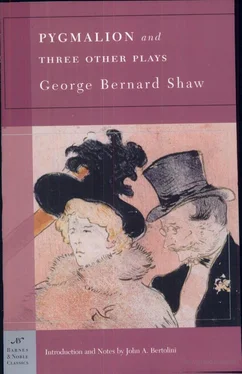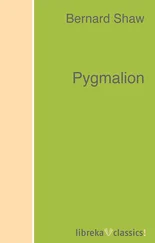Jefferson is surely right that Shaw’s achievement in Major Barbara has two aspects: the variety and plenitude of the world he unfolds before us; and the designing and composing of sentences into harmony, counterpoint, and rhythmical ideas. But let me add a third aspect: the shaping and arranging of action. And it is not for naught that Shaw knew Shakespeare’s plays as he knew Beethoven’s nine symphonies note for note. But Shaw’s view of Shakespeare has often been misunderstood — Shaw loved Shakespeare’s art but did not love what he took to be Shakespeare’s stoic-pessimistic view of life. He said once that no one would ever write a better play than Othello, because humanly speaking, Shakespeare had done the thing as well as it could be done; in the same way no one could improve on Mozart’s music. Shaw learned much from Shakespeare — how much is especially evident in Major Barbara. One of Shakespeare’s triumphant strategies for getting a maximum of meaning out of dramatic form is to parallel actions and stage images in one dramatic scene with another, thereby causing the audience to compare the behavior of one character to that of another. Characters and actions become metaphors — that is, we come to understand a character or an action better, or to rethink our attitude toward it, by its being set parallel to another character in an analogous situation, or by the placement of a similar action in a different context.
For example, Major Barbara enacts a drama of loss of self and rebirth in terms of finding one’s home and one’s work. The protagonist of the play, Barbara Undershaft, is the daughter of an aristocratic mother, Lady Britomart, and a fabulously wealthy and powerful munitions maker, Andrew Undershaft, who is also a foundling (the play has a strong fairy tale/parable quality). In the first act, Andrew Undershaft returns home, to a great house in fashionable Wilton Crescent, after a long absence from family life; he proves so fascinating to his grown children, especially Barbara, that by the end of the act, his wife has been reduced to tears because all her children have deserted her to follow their father into another room, where Andrew has agreed to participate in a nondenominational religious concert. Finally, though, even Lady Britomart is lured by the music and joins her husband and children.
The second act is in every way patterned after the action of the first, though in appearance they could not be more different. Barbara has invited her father the next day to watch her work at her Salvation Army shelter in a neighborhood that is the exact opposite of Wilton Crescent. There, her millionaire father finds cold, brutality, hunger, hypocrisy, and the work of conversion, where Wilton Crescent seemed to provide warmth, comfort, formality, and conversation. But Shaw’s aim is to show that both places are alike in being devoid of authentic religious feeling and genuine spiritual nourishment. Shaw does so by having Undershaft do wittingly to Barbara in the second act what he does unwittingly to her mother in the first act: undermine her sense of self and position. In Lady Britomart, the undermining is limited and temporary, but in Barbara’s case it induces in her a dark night of the soul that makes her resign her job with the Salvation Army. For her father shows his spiritually vital daughter, whose greatest hunger is to affect and transform the souls of people, that her organization can be bought.
When the Salvation Army general, Mrs. Baines, arrives and announces that a number of shelters will close unless the Army secures substantial donations from wealthy benefactors, Under - shaft offers to make a £5,000 contribution, which in turn will compel equal contributions from, among others, a whisky distiller. The general cheerfully accepts, but Barbara is horrified to see the Army “sell itself” by taking donations from a whisky distiller and a munitions maker. Her principled posture makes her resign in a state of tearful despair. (For those who believe with Oscar Wilde that life imitates art and not the other way around, I note that, according to the Associated Press on January 3, 2003, the Salvation Army refused a donation of $100,000 from a lotto winner in Naples, Florida, on the grounds that the Salvation Army counsels families who have lost their homes due to gambling, and would therefore be hypocritical in accepting such a donation!) When the shelters are saved the Army members gather together behind a band that includes both Barbara’s father and her fiance, and march off for a great celebration at the Assembly Hall, leaving the deserted Barbara, stripped of her identity as a saver of souls and stripped of her real home, which was the shelter.
Both the first and second acts, therefore, end with a woman in tears and feeling that everything she valued has been taken from her, put in that state by Andrew Undershaft, her misery accompanied by the sound of music from another place. And just as Shakespeare in Henry IV, Part One describes Hotspur calling for his horse after he has plotted to rebel against the king, and then Falstaff in the next scene calling for his horse during the Gadshill robbery, in order to make us think about what Hotspur’s rebellion has in common with Falstaff’s robbery, in Major Barbara Shaw parallels Lady Britomart and Barbara in order to make us see more complexly the nature of Barbara’s loss. Since Barbara has now lost the two things that above all give us our sense of ourselves — work and home — she will spend the third act trying to find new versions of both, which together mean a new self.
But you need not take my word that setting up parallel actions is Shaw’s method, for he says so himself in the preface, when he explains how he has shown us two attempts on the part of transgressors to pay off the Salvation Army: Bill Walker for having struck Jenny Hill, and Horace Bodger for selling whisky to the poor:
But I, the dramatist, whose business it is to shew the connexion between things that seem apart and unrelated in the haphazard order of events in real life, have contrived to make it [that the Army will take Bodger’s atonement money but not Bill‘s] known to Bill, with the result that the Salvation Army loses its hold of him at once (p. 35).
Here we see Shaw doing just what Aristotle in his Poetics says is the mark of genius in the poet (because it cannot be learned): intuiting the hidden similarity between two apparent dissimilars, or making metaphors. Shaw makes Bill Walker see the comparison so that we will see it, just as Shakespeare makes Prince Hal see the connection between the apparent opposites Falstaff the coward and Hotspur the daredevil, which is that both live outside of all order.
The friends to whom Shaw read Major Barbara were strongly moved by the power of the second act, in which Andrew Undershaft demonstrates the power of the pound over religion, and in doing so makes his daughter feel as if she has lost all purpose in life. In one of the play’s most profound aphorisms, Undershaft reproves Barbara for feeling self-pity by observing to her: “You have learnt something. That always feels at first as if you had lost something” (p. 132). Perceiving something new often means abandoning a cherished view or opinion, and it often hurts to do so, but Shaw puts the emphasis on “at first.” In other words, one can find compensations for losses; one can mend a broken heart.
And so Barbara does when she gets to her father’s cannon-works town with its powerful foundry, its well-tended workers’ dwellings, its families, and its children. She sees that here is a real challenge for her: Can she induce well-fed and well-paid workers to pay attention to their spiritual selves, to their salvation? She decides to renew hope and marry the man who will take over the cannon works from her father. That man turns out to be Cusins. From the premiere of the play in 1906 people have found its ending ambiguous: Do Barbara and Cusins succumb to the allure of materialism in agreeing to take over the cannon works from Undershaft? Or do they intend to use their new power to “make war on war”? Shaw leaves the question unresolved, though he clearly leans toward the latter possibility. In any case, as he said in the postscript to the preface to Back to Methuselah (1921), which he wrote in 1944 for the Oxford World’s Classics edition: It is the job of classic works to “try to solve, or at least to formulate, the riddles of creation.”
Читать дальше












